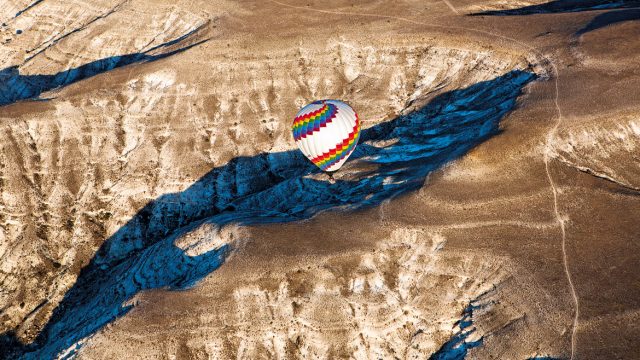In the era of jets, it is novel to be afloat in a hot air balloon. As the final blast of propane from the burner pushed the envelope of the balloon skywards, and my lighter-than-air aircraft lifted off the ground, a small squeal escaped from my six co-passengers. Dangling in an open-air wicker basket held buoyant by an air-filled larger-than-life balloon calling the shots, was understandably unnerving. Equally, if not more, unusual was the landscape that was to unfold beneath us. Situated in the Anatolian region of central Turkey, Cappadocia is fantasyland. In the sweep of its Tolkienesque valleys, honeycombed hills, pigeon houses and the strangest of naturally-eroded rock formations lie millennia-old geological phenomena resulting from volcanic eruptions and erosion.
Watching this landscape slowly come to life as the sun rose over the cliff to the far east, bathing it in golden light, was a surreal moment. Our humble aircraft were mere silhouettes against the pre-dawn sky. Holding on steadily to the burners, the adept pilot got us to a height of nearly 2,000 feet where, suspended in thin air, we gawked with eagle eyes at the stark beauty of Cappadocia below.
Over the next hour we drifted over a quixotic moonland. We navigated the vast air space with smooth ascents and descents, going over hills and wind-moulded cliffs. At times our pilot would descend to catch a wind and we would hover inches above rock-cut valleys—nearly brushing the surface of the wind -rafted formations. Millions of years ago, three prominent volcanoes (now dormant) spewed lava across the land, which solidified over time. Crafted by wind and rain, the plateau selectively eroded the soft tufa volcanic rock, exposing a landscape
of deep gorges, monumental valleys and the beautiful rock formations
called ‘fairy chimneys’.
The cultural history of the region further adds to the uniqueness of the place. Human settlements go as far back as the new stone and copper ages, spanning a period 9,000–5,000 years ago. And the way they put this land to use for habitation was as imaginative as the rock formations that dot the land. As far back as the 3rd century, the early Christians hewed homes, churches and entire underground cities into the soft tufa rock. I explored several valleys, open-air museums and entire underground cities on foot in a packed two-day itinerary. The level of preservation was impressive and provided an insightful peek into the history and culture of the area.
The icing on the cake, without doubt, remained soaring above this chiselled madness in the hot air balloon with emergency WHO numbers ringing in my brain. I covered the distance back to earth carrying the alpenglow of the rising sun and cherished memories from the ride of a lifetime.




